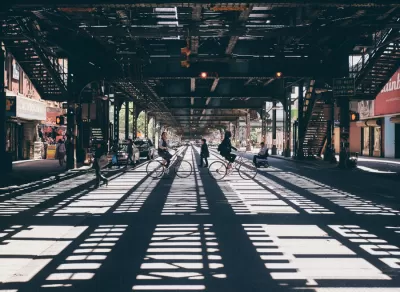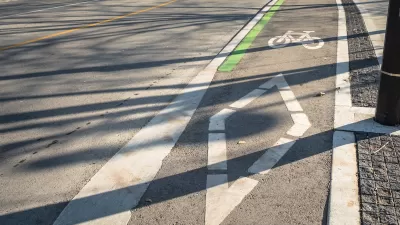Those in search of high-tech solutions for urban congestion and pollution often overlook the bicycle as a powerful, if simple, tool for reducing both and improving urban transportation.

Writing in Next City, Nicolas Collignon argues that it isn’t autonomous or electric vehicles that can change the future of transportation, but rather a much simpler technology: the bicycle. “Sparked by the pandemic, supported by people waking up to the climate crisis and now fuelled by the rising price of oil, we’re living through a bicycle renaissance,” Collignon writes.
Yet a “gap between our imagined future, the promises of techno-kings and the realities of progress” persists. To Collignon, this is in part due to the exciting future visions promised by technologists. But every flying car or delivery robot comes with its own massive set of implications for infrastructure and society. “When we begin to see technology through the lens of systems, it becomes clear that genuine technology-led progress will focus on dealing with the accelerating complexity of today’s world, not increasing the complexity of our tools.”
When it comes to bicycles, Collignon points out that while they are often more efficient and nimble, their very speed and flexibility prevent them from being easily quantified and “optimized” by algorithms. We don’t need to revolutionize the bicycle, “the fastest, most energy efficient, resilient, and lowest carbon emitting urban vehicle,” Collignon writes, but rather change the lens through which we view and organize urban mobility flows.
FULL STORY: Bikes, Not Self Driving Cars, Are The Technological Gateway To Urban Progress

Alabama: Trump Terminates Settlements for Black Communities Harmed By Raw Sewage
Trump deemed the landmark civil rights agreement “illegal DEI and environmental justice policy.”

Planetizen Federal Action Tracker
A weekly monitor of how Trump’s orders and actions are impacting planners and planning in America.

How Atlanta Built 7,000 Housing Units in 3 Years
The city’s comprehensive, neighborhood-focused housing strategy focuses on identifying properties and land that can be repurposed for housing and encouraging development in underserved neighborhoods.

In Both Crashes and Crime, Public Transportation is Far Safer than Driving
Contrary to popular assumptions, public transportation has far lower crash and crime rates than automobile travel. For safer communities, improve and encourage transit travel.

Report: Zoning Reforms Should Complement Nashville’s Ambitious Transit Plan
Without reform, restrictive zoning codes will limit the impact of the city’s planned transit expansion and could exclude some of the residents who depend on transit the most.

Judge Orders Release of Frozen IRA, IIJA Funding
The decision is a victory for environmental groups who charged that freezing funds for critical infrastructure and disaster response programs caused “real and irreparable harm” to communities.
Urban Design for Planners 1: Software Tools
This six-course series explores essential urban design concepts using open source software and equips planners with the tools they need to participate fully in the urban design process.
Planning for Universal Design
Learn the tools for implementing Universal Design in planning regulations.
Jessamine County Fiscal Court
Caltrans
Institute for Housing and Urban Development Studies (IHS)
City of Grandview
Harvard GSD Executive Education
Toledo-Lucas County Plan Commissions
Salt Lake City
NYU Wagner Graduate School of Public Service





























